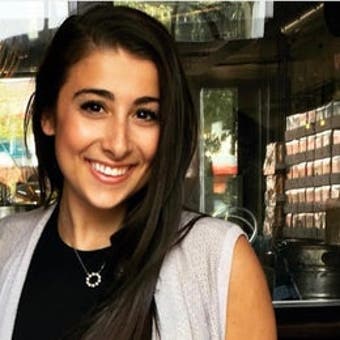Daniel Cameron responds to Breonna Taylor’s family seeking to reopen case
Kentucky Attorney General Daniel Cameron responds to Breonna Taylor's family's attorney on 'Fox & Friends.'
A lawyer representing one of the grand jurors in the Breonna Taylor case has fired back against Kentucky Attorney General Daniel Cameron’s arguments that such proceedings should be kept secret, criticizing the official for allegedly unfairly picking and choosing when to enforce such secrecy rules, according to court documents.
Kevin Glogower, who represents one of the jurors seeking to be able to speak out about the widely publicized case, said in a motion filed on Sunday that Cameron, a Republican, "cannot choose to part from the rules in disclosing information and then use his position to prevent others from responding to his misleading remarks,” according to the motion.
The attorney general and the commonwealth “have placed much of the proceedings into the public realm without a fight while clinging to this antiquated application,” the motion states. “Yet they can point to nothing specifically that needs to remain shrouded in mystery other than their own statements and actions.”
When reached by Fox News on Tuesday, a spokesperson for Cameron's office pointed to his most recently released statement, but would not comment further.
Cameron argued last Wednesday that the judge should dismiss the request by the grand juror. He said in a statement that grand jury proceedings are kept confidential by legal precedent to protect the safety and anonymity of all involved — grand jurors, witnesses, and others.
“As I’ve stated prior, I have no concerns with a grand juror sharing their thoughts or opinions about me and my office’s involvement in the matter involving the death of Ms. Breonna Taylor,” he said in a prepared statement at the time. “However, I have concerns with a grand juror seeking to make anonymous and unlimited disclosures about the grand jury proceedings. The grand jury process is secretive for a reason, to protect the safety and anonymity of all the grand jurors, witnesses, and innocent persons involved in the proceedings. Allowing this disclosure would irreversibly alter Kentucky’s legal system by making it difficult for prosecutors and the public to have confidence in the secrecy of the grand jury process.”
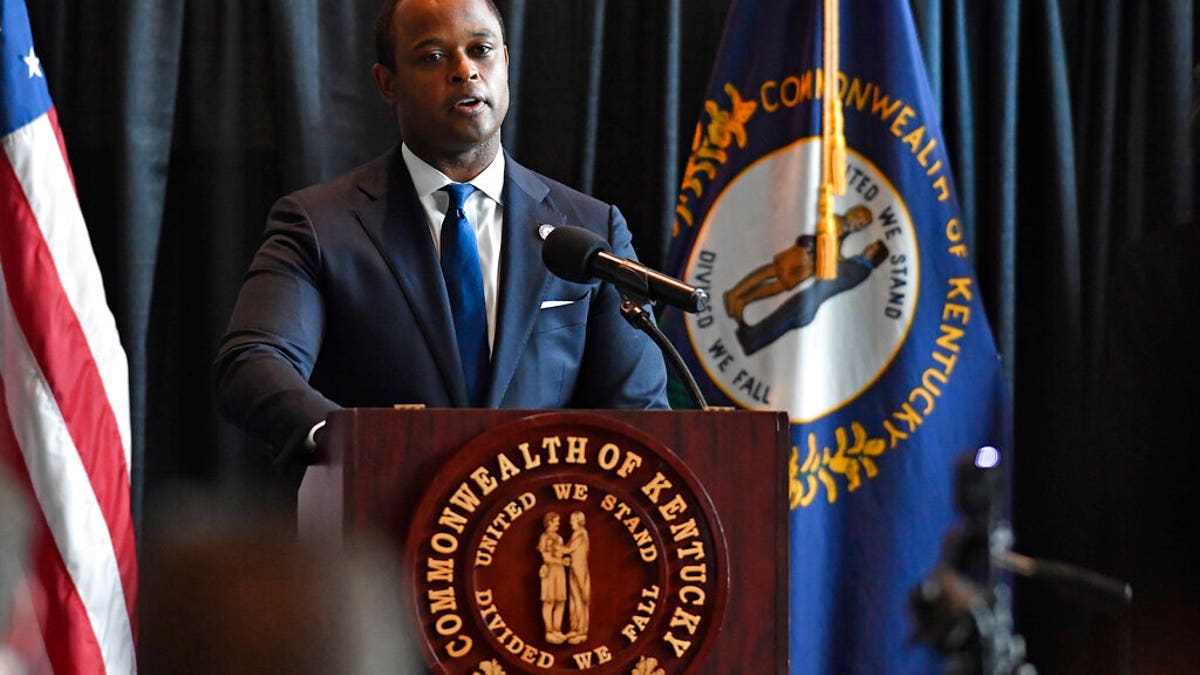
Kentucky Attorney General Daniel Cameron addresses the media following the return of a grand jury investigation into the death of Breonna Taylor, in Frankfort, Ky., Wednesday, Sept. 23, 2020. (AP Photo/Timothy D. Easley)
BREONNA TAYLOR DEATH: LOUISVILLE POLICE DOCUMENTS SHINE LIGHT INTO INVESTIGATION DETAILS
But that same day, police released files showing contacts between Taylor and a man she dated previously who was suspected of drug dealing. The release of those files raised new questions about what led narcotics investigators to raid Taylor’s home in March, resulting in her death.
Taylor, a 26-year-old Black woman who worked as an emergency room worker, lived with her sister in an apartment in Louisville. She and her boyfriend, Kenneth Walker, were in her bedroom on the night of March 13 when police came to her door with a narcotics warrant.
Cameron, the state’s first Black attorney general, previously said Louisville Metro Police Sgt. John Mattingly entered Taylor’s home after the door had been broken in. Walker then allegedly shot him in the leg, later explaining that he thought an intruder was breaking in, according to reports.
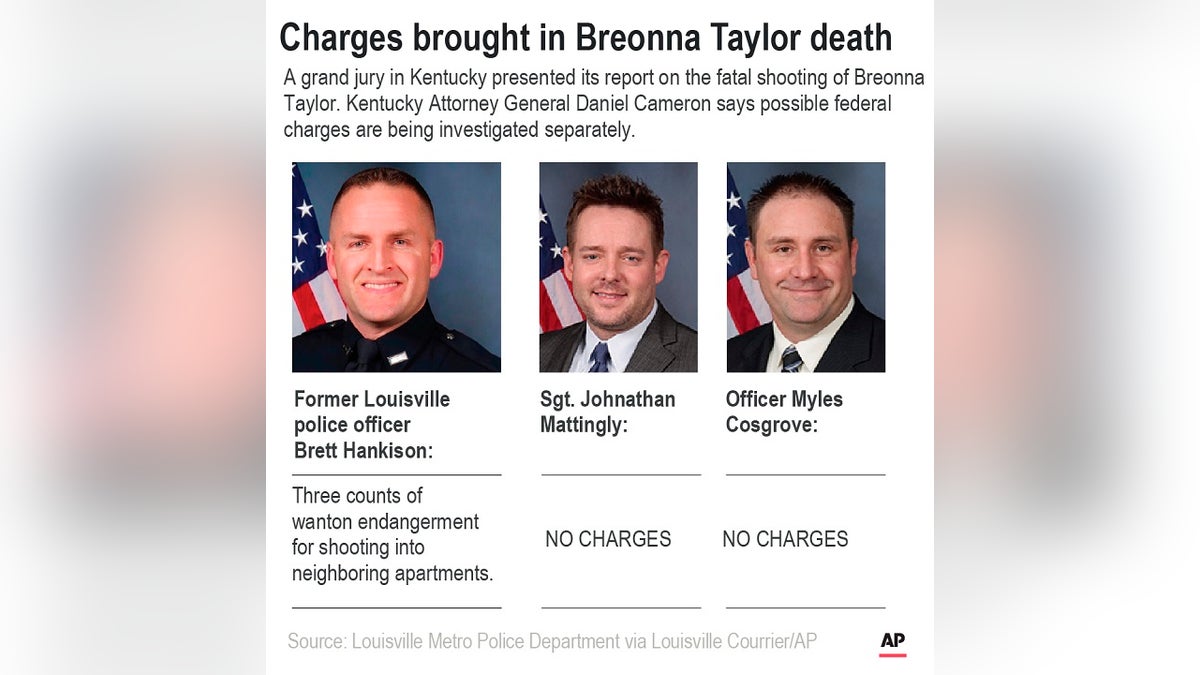
Louisville Metro Police Department Sgt. Jonathan Mattingly, Officer Myles Cosgrove and former officer Brett Hankinson were involved in the raid that ended with Breonna Taylor's death. Members of the department's SWAT unit have criticized the raid and its execution, according to internal interviews. (Louisville Metro Police Department via Louisville Courier-Journal / AP)
Mattingly, Detective Brett Hankison, and Detective Myles Cosgrove then returned fire; Taylor was shot six times, Cameron said.
For months, the raid had been characterized in reports and by officials as the execution of a "no-knock warrant," meaning law enforcement officers enter without knocking or announcing themselves. But Cameron later clarified that officers did knock because of the sensitive nature of the investigation before breaking down the door, according to a neighbor in the building.
Walker reportedly said he did not hear officers identify themselves.
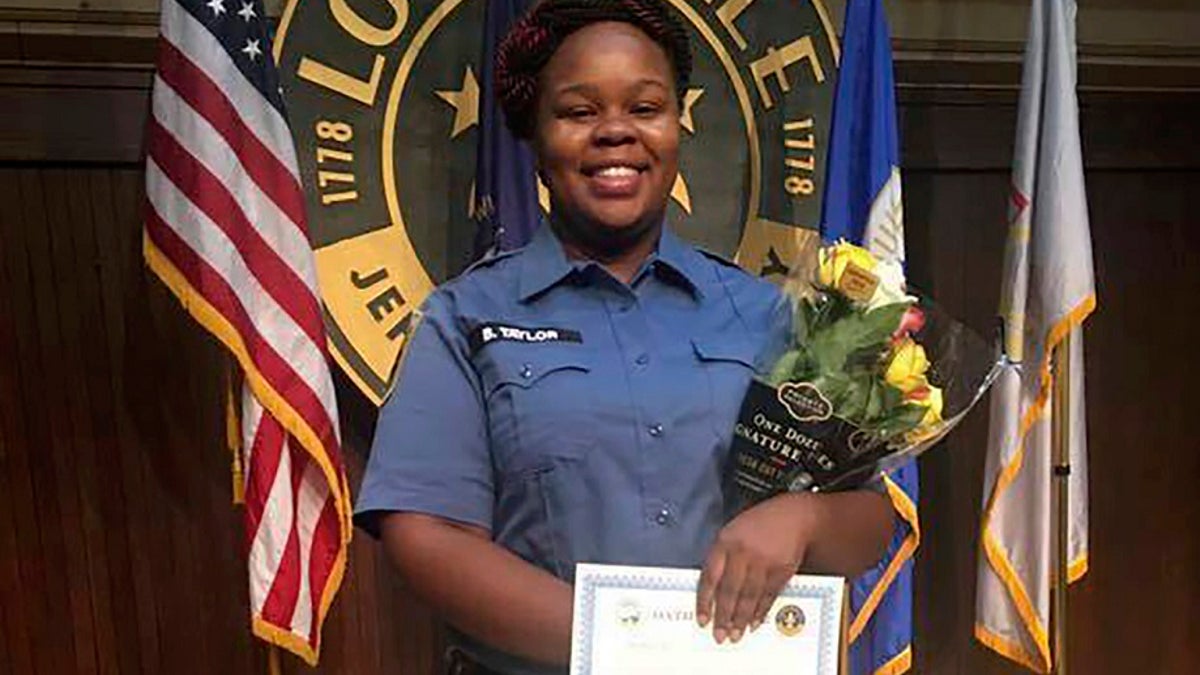
This undated photo provided by Taylor family attorney Sam Aguiar shows Breonna Taylor in Louisville, Ky. A grand juror in has filed a suit asking the court to release records and transcripts of the proceedings. (Courtesy of Taylor Family attorney Sam Aguiar via AP, File)
The grand jury ultimately decided to indict Hankison but not Mattingly or Cosgrove on wanton endangerment charges for allegedly firing bullets into the neighboring apartment with three people inside. He has since pleaded not guilty.
GRAND JUROR IN BREONNA TAYLOR CASE FILES LAWSUIT TO RELEASE CASE TRANSCRIPT SO JUSTICE MAY PREVAIL'
None of the officers were indicted on charges directly related to Taylor’s death. Cameron, who presented the evidence to the jury, later admitted he did not recommend murder charges.
Gloglower points to Cameron's previous on-air statements about how the jury was able to “steer the conversation" in asking about additional charges against the officers and argues that the jurors would not have had any basis of knowledge to do so because of the “misleading” way in which their questions were answered.
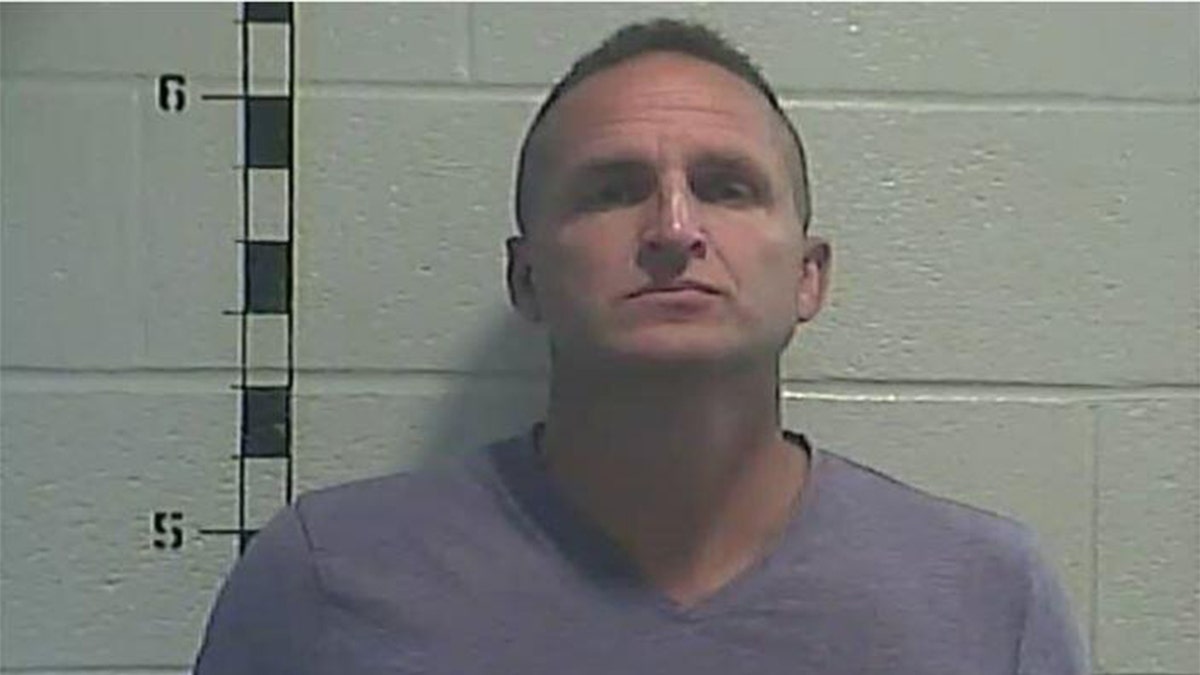
Brett Hankison booking photo (Shelby County Detention Center)
“The grand jury asked multiple questions about the warrant. We now know from the released Public Integrity files that the information about the warrant application and execution provided to the grand jury was misleading,” the motion states.
It further describes how the grand jury asked for sketches, but was told “the Attorney General’s investigators never even saw” them. The jurors asked about additional body camera footage but were told that “they did not have enough time to watch them.”
“They asked probing questions about the evidence, the individuals involved, and the investigation by all agencies. The grand jurors clearly anticipated discussing some charges directly related to Ms. Taylor’s death,” the motion further states. “When it was all over it certainly appears they were only given the option of indicting three counts of wanton endangerment."
He also questioned Cameron's statements regarding the officers' involvement in the case prior to her shooting death, calling it "misleading, if not outright false," the motion states.
Cameron had previously said he had no concerns with grand jurors speaking publicly, and he agreed to the release of audiotapes of testimony presented to the grand jury earlier this month. But those recordings did not include any discussion of potential criminal action on the part of the officers who shot Taylor.
On Thursday, Glogower told Jefferson County Circuit Judge Annie O’Connell that the goal was not to publicize evidence that hasn’t become public or “to be part of a global discussion in race relations.”
“It’s more about the discussions that were held directly with the prosecutors,” Glogower said. “That is not contained in the recording.”
CLICK HERE TO GET THE FOX NEWS APP
Glogower warned that future grand jurors wouldn’t want to serve if the prosecutor can “throw them under the bus, as happened here.”
O’Connell has reportedly not yet ruled on the case, but vowed on Thursday to do so “as soon as possible.”
The Associated Press contributed to this report.
